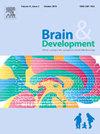印度裔布朗-维亚莱托-范雷尔综合征患者的异常表型:SLC52A2和SLC52A3基因临床变异的功能分析
IF 1.4
4区 医学
Q4 CLINICAL NEUROLOGY
引用次数: 0
摘要
dbvvls (Brown-Vialetto-Van Laere综合征)是一种罕见的遗传性疾病,以进行性神经病变为特征,由编码hRFVT-2和hRFVT-3的SLC52A2和SLC52A3基因缺陷引起。方法采用外显子组测序技术筛选5例BVVLS患者的致病变异,并通过硅分析、核黄素转运试验和共聚焦成像评估其功能贡献。结果本研究纳入的先证者表现出不同寻常的表型,如并指、多指、足部水肿和慢性骨髓炎。基因检测结果显示,5例SLC52A2基因中均存在c.229G>A . p.E77K、c.384G>A . p.S128S、c.1245C>T . p.G415G和c.843del p.L282Cfs*8杂合变异体,SLC52A3基因中存在c.833C>T . p.T278M、c.907A>G . i303v和c.62A>G . 62a>G . n21s。其中p.L282Cfs*8为首次诊断,p.E77K和p.S128S为既往报道,核苷酸位置变异。p.E77K、p.S128S、p.T278M和p.I303V的功能分析显示核黄素转运受损,而p.G415G和p.L282Cfs*8未显示明显变化。尽管核黄素摄取减少,但在无症状父亲中存在相同的多态性变异(p.T278M和p.t 303v)表明它不太可能与疾病表型相关。与此同时,hRFVT-2变异体p.S128S和p.E77K的膜性表达被取消,大部分内化在转染细胞的细胞质区域,而除野生型外,其他变异体均未见变化。结论BVVLS相关hRFVT-2变异体p.S128S和p.E77K影响核黄素的转运功能,这是由于转运体的膜定位和/或活性被破坏。hRFVT-3的多态性变异p.T278M和p.I303V不太可能在功能上与该疾病的发病机制有关。本文章由计算机程序翻译,如有差异,请以英文原文为准。
Brown-Vialetto-Van Laere syndrome patients with unusual phenotypes from Indian ethnicity: Functional analysis of clinical variants in SLC52A2 and SLC52A3 genes
Background
BVVLS (Brown-Vialetto-Van Laere syndrome), a rare genetic condition characterized by progressive neuropathy, is caused by defects in SLC52A2 and SLC52A3 genes coding for hRFVT-2 and hRFVT-3.
Methods
Five BVVLS cases were screened for disease-causing variants using exome sequencing and their functional contributions were evaluated by in silico analysis, riboflavin transport assay and confocal imaging.
Results
Probands enrolled in this study were presented with unusual phenotypes like syndactyly, polydactyly, pedal edema and chronic osteomyelitis. Genetic testing disclosed heterozygous variants in all five cases including c.229G>A p.E77K, c.384G>A p.S128S, c.1245C>T p.G415G and c.843del p.L282Cfs*8 in SLC52A2 gene and c.833C>T p.T278M, c.907A>G p.I303V and c.62A>G p.N21S in SLC52A3 gene. Among them, p.L282Cfs*8 was diagnosed here for first-time, whereas p.E77K and p.S128S were reported previously with a variation at nucleotide position. Functional analysis of the variant p.E77K, p.S128S, p.T278M and p.I303V evidenced impairment in riboflavin transport, whereas p.G415G and p.L282Cfs*8 showed no significant changes. Despite of having reduction in riboflavin uptake, the presence of same polymorphic variant (p.T278M and p.I303V) in asymptomatic father suggests it as not likely associated with disease phenotypes. Meantime, membranous expression of hRFVT-2 variants p.S128S and p.E77K were abrogated and mostly internalized in cytoplasmic regions of transfected cells, whereas no change was observed with other variants than wild-type.
Conclusion
These results show for the first-time that BVVLS associated hRFVT-2 variants p.S128S and p.E77K affected riboflavin transport function due to abrogation in membranous localization and/or activity of the transporter. The polymorphic variants p.T278M and p.I303V of hRFVT-3 are unlikely to be implicated functionally in the pathogenesis of the disease.
求助全文
通过发布文献求助,成功后即可免费获取论文全文。
去求助
来源期刊

Brain & Development
医学-临床神经学
CiteScore
3.60
自引率
0.00%
发文量
153
审稿时长
50 days
期刊介绍:
Brain and Development (ISSN 0387-7604) is the Official Journal of the Japanese Society of Child Neurology, and is aimed to promote clinical child neurology and developmental neuroscience.
The journal is devoted to publishing Review Articles, Full Length Original Papers, Case Reports and Letters to the Editor in the field of Child Neurology and related sciences. Proceedings of meetings, and professional announcements will be published at the Editor''s discretion. Letters concerning articles published in Brain and Development and other relevant issues are also welcome.
 求助内容:
求助内容: 应助结果提醒方式:
应助结果提醒方式:


